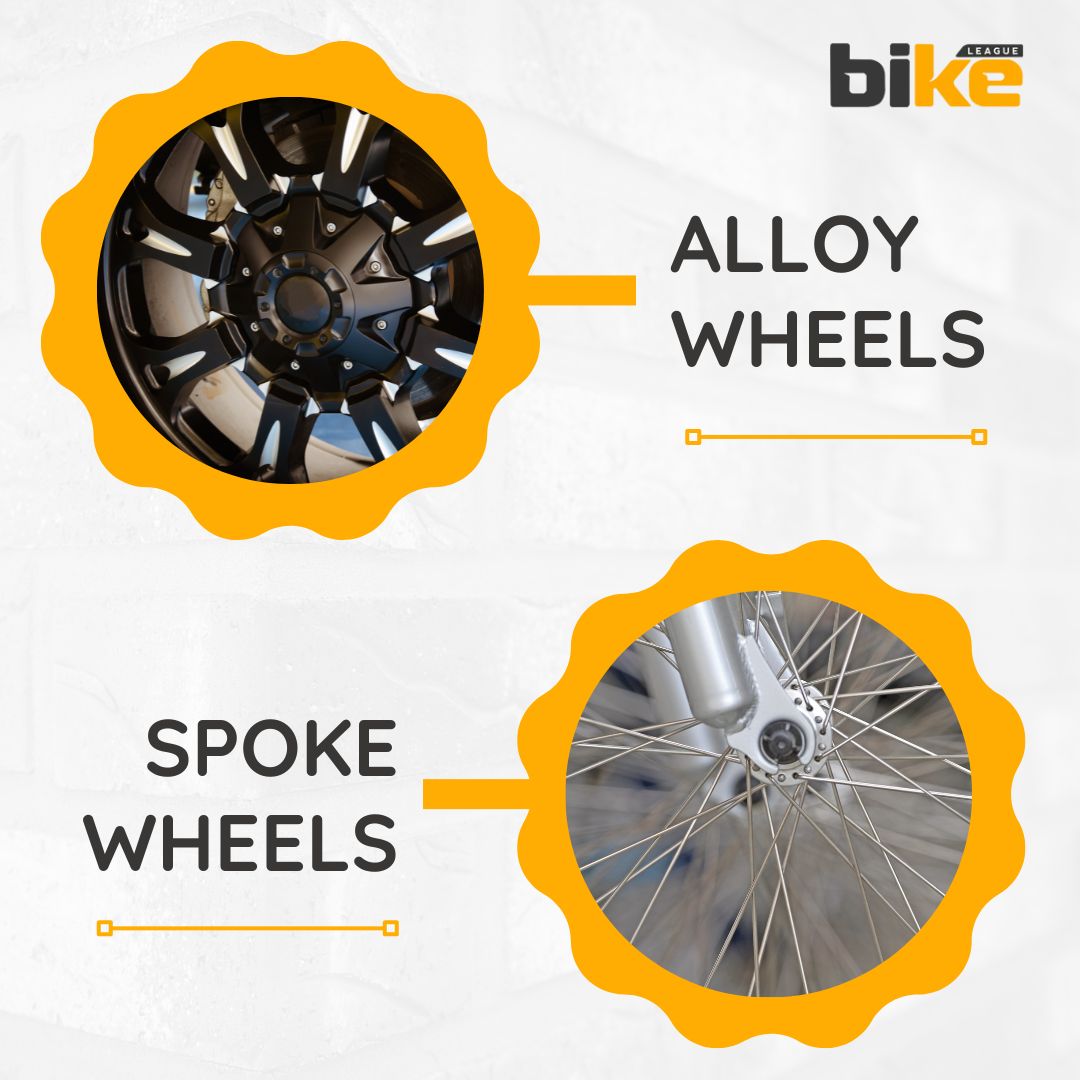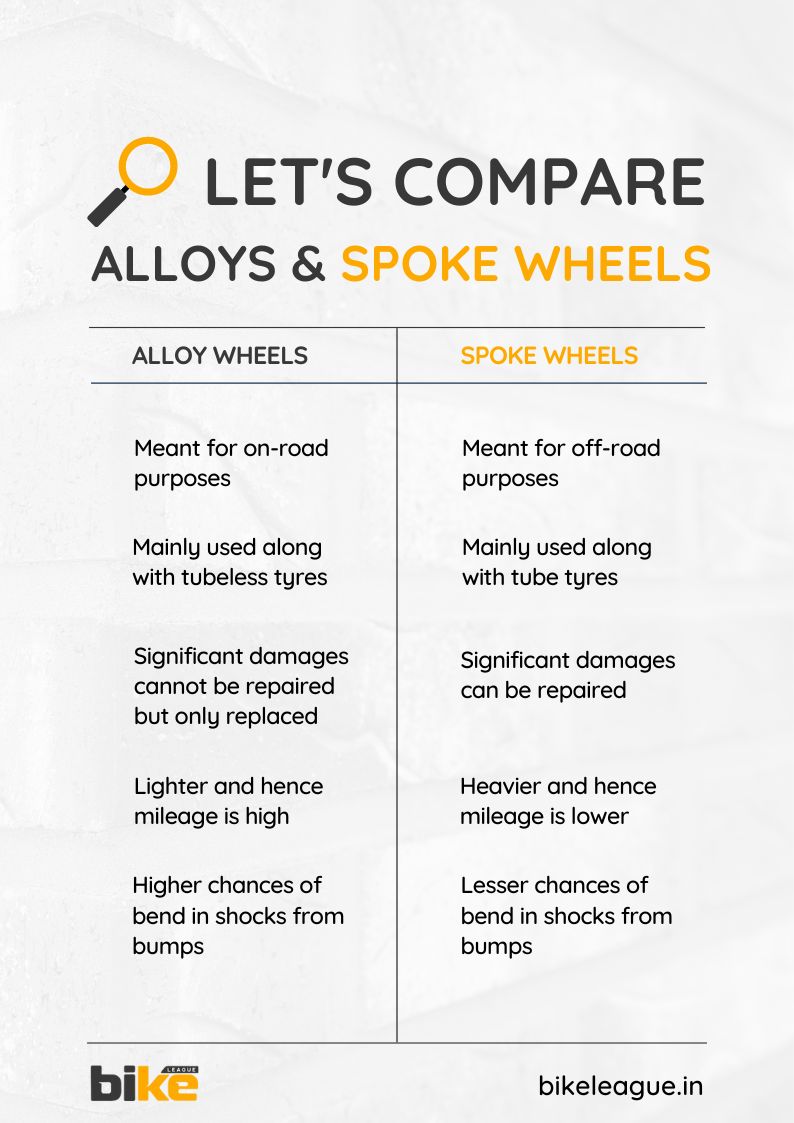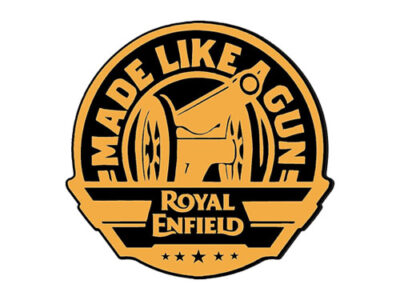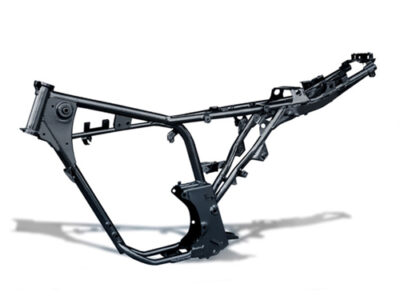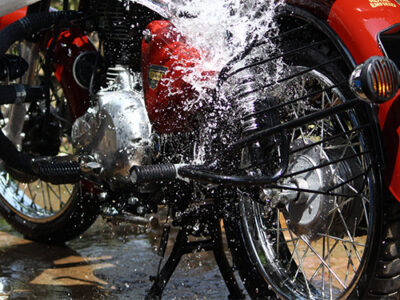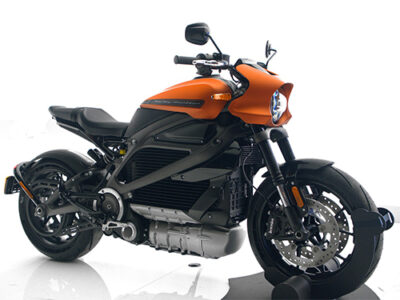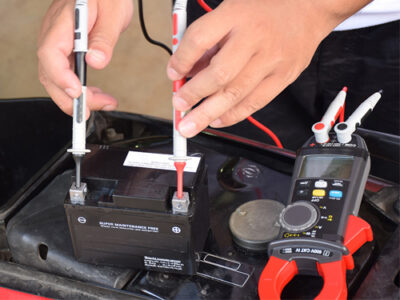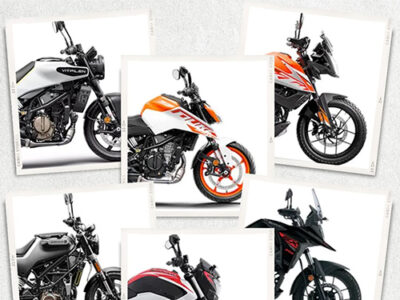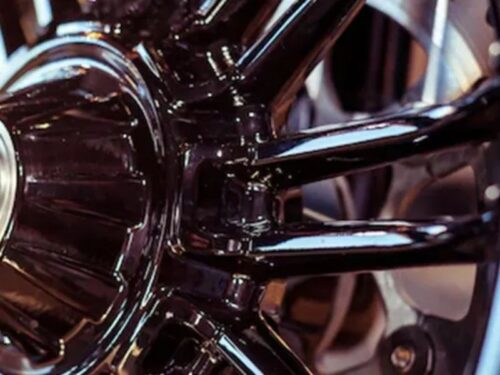
|
Getting your Trinity Audio player ready...
|
Long story short – Alloy wheels are for on-road purposes while spoke wheels are for off-road purposes, but what about other features?
Wheels are the only thing that comes in contact with the ground in a motorcycle. Yes. What shoes are meant for legs is what wheels are for a bike. It is a significant part of the motorcycle. A wheel is a circular component intended to rotate on an axle bearing. In that, a wheel consists of alloy/spoke along with tyres. In this article, our focus is purely on wheels. Wheel types vary depending on the motorcycle riding conditions, like off-road or on-road. Etc. It’s time to delve deep into the world of circular wheels, and let’s get A-Z of wheels discussed right here.
Types of Wheels
When were spoke wheels invented?
Spoke wheels are traditional ones used before the 1970s. These spoke wheels made from cast aluminum changed the dynamics of the motorcycling industry as they were low in price, spoke wheels were easy to manufacture, and allowed bikes to run without tubes.
How spoke wheels work
Spoke wheels work on the simple principle of tension. The spokes or wires on the wheel going all crisscross are nothing but the steel wires creating stress on the wheel rim. Spokes help the wheel keep its shape and even take on load on itself.
Does the number of spokes in wheels increase ride quality?
The greater the number of spokes, the better strength the wheel gets. But it also affects the overall aerodynamics of the bike. The higher number of spokes creates more wind resistance and a loss of power transmission to the wheels.
Are spoke wheels reliable?
First, let’s deduce from your requirements that sturdiness–spoke wheels are much better in terms of reliability. They are repairable and do not crack or lose composure in bumps.
Can spokes in spoke wheels be replaced?
A faulty or damaged spoke should be replaced. In a properly built wheel, stainless steel spokes don’t suffer from fatigue, so that a fatigue failure can be the first of many. Two or more fatigue failure means rebuilding the whole wheel with new spokes is the best option.
Can spoke wheels and tubeless tyres be used together?
The spoke nipples have a particular gap between the rim, and the spoke tensioner, which would cause leaks if fitted with tubeless tyres. Hence, tubeless tyres couldn’t fit in spoke wheels. While there are exceptions in the spoke wheels of superbikes as the spoke nipples are sealed during the manufacturing process.
Advantages of spoke wheels
Usable in off-roading
When a bike hits a bump during off-roading, the wheel absorbs most of the shock. The result is less shock traveled to the suspension and the rider. The spoke wheel tends to bend or crack under intense pressure if the spoke wheel isn’t flexible. That’s why spoke are designed to flex and handle the impacts of the heavy shock during off-roading.
Easy to repair
Spoke wheels are easily repairable, replacable with individual parts, and are inexpensive.
Cheaper to purchase
Steel is used for making spoke wheels; overall, less steel is used. Its manufacturing process is simple, and technology is entirely mature.
Disadvantages of Spoke wheels
Heavier
The spoke wheels are much heavier because they are steel-made.
Less fuel efficiency
Because of the heavier weight, spoke wheels consume more fuel, and the crisscrossing of the spokes increases aerodynamic drag, thus impacting performance.
Design of the wheels
As we all know, spoke wheels are traditional. So that’s why spoke wheels are available in one single color.
Unknown fact about motorcycle spoke wheels
Spoked wheels have been around for centuries.
The earliest known spoked wheels date back to around 3500 BC. They were used on chariots in Mesopotamia, and they quickly became the standard for wheeled vehicles.
What are alloy wheels?
An alloy wheel is nonferrous with different metals heated at different levels. Two prominent metals found in most alloy wheels are magnesium and aluminum.
What types of metals are used in Alloy Wheels?
Alloy wheels are new-age tubeless wheels designed to provide enhanced performance with more safety. They have changed the model of the wheel manufacturing industry. Alloys consists of metals like aluminum
and magnesium; they are light in weight and, thus, enhance the bike’s performance.
When Alloy wheels are invented
In April 1922, Borrani started the production of motorcycle wheels with an aluminum rim. Although cast wheels had already been used on automobiles previously, it was in 1927 that the Bohme Land, a motorcycle built in Czechoslovakia, was fitted with cast wheels.
Can Alloy wheels be replaced?
The user cannot repair damaged alloy wheels; the only option is to replace the damaged one with a new one.
Why are tubeless tyres suitable for alloy wheels?
Alloy wheels are perfect for tubeless tyres because of the sitting position of the tyre on the rim. The tyre fits perfectly and accurately on the rim in the periphery, which is very important; improper fitting may cause the bike to start wobbling at the time of riding.
Advantages of Alloy wheels
Rigidity
The rigidity aspect of alloy wheels helps them endure high horsepower and torque relatively easily. As a result, they are more stable at high speeds. It is inflexible and offers more feedback, making it better and more consistent at high speeds. Alloy wheels are for tubeless tyres, thus simplifying wheel changes and puncture repairs. Furthermore, the construction is purely automated, meaning alloy wheels can be made thousands of times daily.
Fuel efficiency
In India, the road condition is deplorable; hence, we need wheels that can bear the brunt while promising a smooth ride to the commuter. Despite this, bike manufacturers use more alloy wheels because they are light in weight. The alloys over spoke wheels reduce the bike’s overall weight; hence, alloy wheels promise better fuel efficiency at low fuel consumption than spoke wheels.
Excellent Stability
Sports bikes need fast acceleration. Hence, they use alloy wheels that are light in weight and offer maximum speed. Also, they provide excellent stability even at high speed.
Disadvantages of Alloy wheels
Expensive
You will pay 50 percent more than a spoke wheel to buy an alloy wheel. Alloys are expensive because of their elaborate production procedure.
Maintenance
Alloy wheels are expensive to repair and maintain. Unlike spoke wheels, they require complex repair methods to bring them back to their original space.
Lesser durability
Alloy wheels are light in weight and tend to bend. However, they are comparatively less flexible than spoke wheels. Hence, alloy wheels are not suitable for off-roading.
Unknown fact about motorcycle spoke wheels
Alloy wheels were first developed for aircraft
In the early 1900s, aircraft manufacturers were looking for a way to make their planes lighter and stronger. Alloy wheels were the perfect solution, as they were lighter than spoked wheels and could withstand the rigors of flight.
Do motorcycle wheels need alignment?
Generally not needed if it is an alloy wheel. But the spoke wheels need alignment.
Where to buy motorcycle wheels online?
Always look for motorcycle wheels on the official company website or e-commerce portals like Amazon India or Flipkart. You can refer online for color options and other details. But never buy online.
Always buy motorcycle wheels offline.
Yes, without a doubt, you should buy motorcycle wheels offline to check the wheels’ size, quality, and color and make the final decision only after seeing the wheels. So, always purchase offline.
Conclusion
From the above discussion, it is evident that there is no one-size-fits-all when debating which wheels are better, spokes or alloy. Given a chance, I would choose an alloy wheel because the tubeless tyre is lighter and fixing a puncture on a tubeless tire is much faster and simpler. It is more accessible than dealing with an inner tube.
But if you want hardcore off-roading, you should opt for spoke wheels. Rims, spokes, hubs, and a tube might make it a bit heavier. Fixing it, too, can be a pain, but at least if you manage to damage the wheel, you won’t have to replace the entire wheel, just one small part unwillingly.
For example, in theory, if you dent a rim, you can unbend a rim or replace the rim without really touching the spokes or the hub. You can even replace one spoke at a time if you break spokes. If you break a hub-
which is very rare; you can replace the hub without touching the rest of the wheel.
So, for the more performance-oriented road bikes – you should choose cast-alloy wheels because cast wheels are easier to make. They are more consistent in their performance, and you get better feedback. But when you start talking about off-roader motorcycles that go into difficult conditions, you should go with spoke wheels because they are easier to fix and deal with uneven roads well.
If you have any other doubts or queries, email us at bikeleague2017@gmail.com. We are always eager to help and assist you. Also, here are several social media platforms of Bikeleague India to raise your suspicions.

